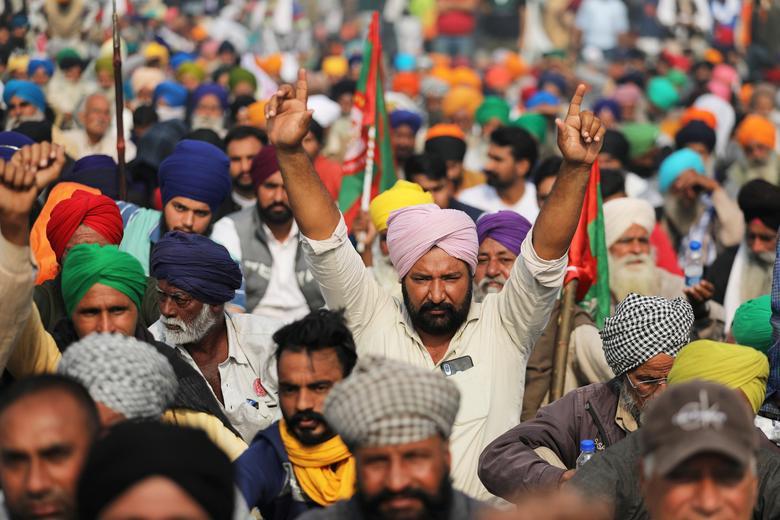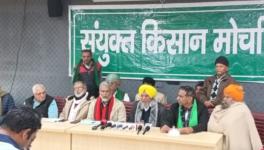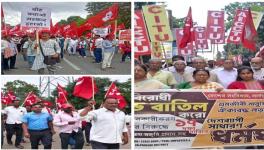Why it is Not Yet Time for Peasants to Return Home from Protests

Image Courtesy: Reuters
It has been presumed for long that Prime Minister Narendra Modi is a strongman in a mould cloned across the world in the past decade or more, from East and Central Asia through Turkey, East Europe and Latin America right into the putative birthplaces of democracy in North America and West Europe.
Modi and his regime share the pathologies of regimes scattered across the planet: a monarchical style of decision-making that is unilateral, absolutist and, therefore, non-negotiable. On 19 November, Modi’s monarchical vestments were in tatters when he declared unilaterally that the three farm laws that farmers have been protesting against for nigh a year, mainly in Haryana, Punjab and western Uttar Pradesh, would be repealed in the Winter Session of Parliament, which kicks off on 29 November.
There can be no doubt that Modi’s monarchical pretensions have been taken to the cleaners by the unflinching opposition of the peasantry supported by networks of industrial workers, civil society activists, academics, students and plain Joe Citizens.
Yet, it would be premature to conclude that Modi has been sufficiently chastened to have undergone a damascene conversion and learnt to listen to those he supposedly represents; that this could be the moment when the regime becomes a truly representative government. The spectacular climbdown is a concession wrung out only by electoral imperatives. Modi capitulated because he suspected that had he not done so, defeat in the imminent Uttar Pradesh elections was a real possibility. We also know that he and Union Home Minister Amit Shah understand only this imperative. For this regime, contesting and winning elections is the distilled essence of politics, which is the primary reason they are so excruciatingly clueless about governance.
For Modi and Shah and the assorted lackeys and malcontents who have gravitated into their orbit, winning elections is the only game in town, to be followed by a thoroughgoing subversion of foundations of republican democracy to actualise the Sangh parivar and Bharatiya Janata Party’s (BJP’s) Hindutva agenda, which is again, at least partly, an instrument for winning more elections. That completes a vicious downward spiral.
To return then to the heroic struggle spearheaded mainly by the rich and middle peasants of northern India, we can discern that their victory in the form of the proposed repeal of the impugned farm laws is a partial victory. Before proceeding further, let us look at what exactly has been taken off the table. The laws to be repealed are: the Farmers’ Produce Trade and Commerce (Promotion and Facilitation) Act, 2020; the Farmers (Empowerment and Protection) Agreement of Price Assurance and Farm Services Act, 2020; and the Essential Commodities (Amendment) Act, 2020. It should be enough to posit the proposition, in keeping with the perception and understanding of the agitating peasants, that together they are aimed at creating a marketing infrastructure which would give big-ticket buyers, mostly corporate entities, both oligopsonistic and oligopolistic advantages in the market, disadvantaging both sellers, i.e., the peasants, and buyers, i.e. the citizenry.
The specific objections were that it would undermine procurement and provisions for a minimum support price (MSP), encourage contract farming, which has had a dodgy track record in places as diverse as South America and Southeast Asia, and give a fillip to hoarding. All these concerns have substance.
The Modi regime, however, proceeded unilaterally on monarchical and paternalistic assumptions, failed to hold any kind of consultations with anyone, initially introduced the laws as ordinances and, finally, railroaded them through both houses of Parliament, without even the customary reference to a joint select committee. Both the substance of the laws and the style of their enactment provoked the backlash.
The leadership of the Samyukta Kisan Morcha (SKM) has made it clear that the necessary but not sufficient condition for any movement forward is the actual repeal of the laws. The agitating farmers don’t trust the government for a variety of reasons: principally the invective directed at them by the prime minister himself and senior ministers during the course of the agitation and the divisive manner in which Modi made the announcement. There was no word of sympathy for the 700-odd people who lost their lives, nor any for the privations faced by the peasants through the Covid pandemic, a harsh winter and searing summer.
There is also a legitimate concern that Modi may renege on his commitment once the agitators have dispersed given his record of serial prevarication and addiction to falsehood. Concern may also have been fuelled by Rajasthan Governor Kalraj Mishra’s statement on 21 November that if needed the three laws could be re-enacted, which was echoed by BJP MP Sakshi Maharaj.
The SKM has not already said that, apart from not disbanding, the movement will continue through, first, its mahapanchayat in Lucknow on 22 November and the tractor march to Parliament on 29 November. Meeting on 21 November, the SKM, however, wrote an open letter to the prime minister referencing some issues, which will be reviewed when the leadership meets again on 27 November to firm up plans.
Of the outstanding issues, MSP is the most important. From the outset, the SKM had demanded central legislation guaranteeing procurement and minimum prices for all produce, calculated according to the expansive formula proposes by the Swaminathan committee. At present, only 23 crops are procured on the basis of a disputed MSP, including seven cereals, five pulses, seven oilseeds and four cash crops. This demand will resonate with peasants across the spectrum throughout the country even more than the one for the repeal of the three laws and could widen the ambit of mobilization.
The other important demand is that the draft Electricity (Amendment) Bill be withdrawn. They object to proposals for the privatization of the power sector and possible withdrawal or reduction of subsidies. Provisions for the imposition of fines for stubble-burning under the Commission for Air a Management Law are also a bugbear.
Among the other demands is compensation for the 700-odd peasants who died during the year-long agitation, alongside the withdrawal of all cases filed against the agitating peasants. A demand for the sacking and arrest of Union Minister of State for Home Ajay Mishra ‘Teni’ has already been aired. The minister’s car ran over and killed protesting peasants in Lakhimpur Kheri. His son is implicated in the case.
All these demands were iterated at the mahapanchayat in Lucknow. Additionally, the SKM vowed to work towards defeating the BJP in Uttar Pradesh, just as it had in Bengal earlier this year. One leader also likened AIMIM boss Asaduddin Owaisi, who plans to contest 100 seats in Uttar Pradesh, as the BJP’s ‘uncle’, working assiduously to divide the Muslim vote. But, he said, the peasants understood this ploy, and would not be divided.
The SKM will also be aware that they hold the whip hand only until the elections in Uttar Pradesh are held. After that, whatever the outcomes, they will not have a bargaining position. It would make sense to get their demands met before then. They must not, therefore, disband. Since Modi and his regime recognize only the compulsion of winning elections, they are as prepared to compromise as they are to lie, cheat and suborn to achieve it.
It is time for the SKM to tighten the screws and keep alive their election campaign against the BJP in the states where elections will be held soon, especially Punjab and Uttar Pradesh.
The author is an independent journalist and writer. The views are personal.
Get the latest reports & analysis with people's perspective on Protests, movements & deep analytical videos, discussions of the current affairs in your Telegram app. Subscribe to NewsClick's Telegram channel & get Real-Time updates on stories, as they get published on our website.
























